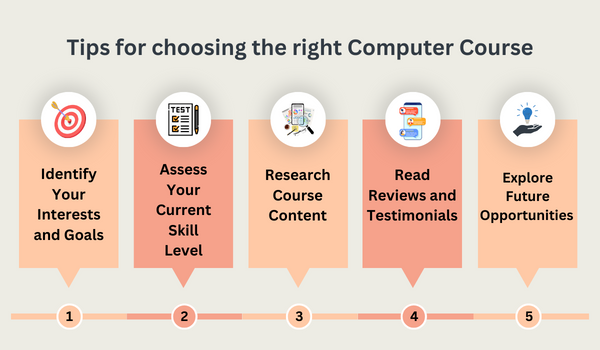In today's digital era, computer skills are more essential than ever. Whether you're a student looking to enhance your academic journey, a professional aiming to upskill, or someone intrigued by the world of technology, choosing the right computer course can open up a world of opportunities. With many options available, navigating this decision wisely is essential to ensure it aligns with your goals and aspirations.
Here's a simple guide to help you choose the perfect computer course.

Identify Your Interests and Goals:
What are you passionate about? What do you want to achieve by learning computer skills? Do you want to create websites, design graphics, or build apps? Do you want to start your own business or get a job in the tech industry? Once you know what interests you, you can start narrowing down your options.
Once you better understand your interests and goals, you can start to research different computer courses. There are many great courses available.
Here are some resources that can help you identify your interests and goals:
Online quizzes, Talk to people in the tech industry, Shadow someone in the tech industry, and Take a free introductory course.
By taking the time to identify your interests and goals, you can choose the right computer course and set yourself up for success.
Assess Your Current Skill Level:
Before starting a computer course, assessing your current skill level is essential.
There are a few ways to assess your skill level. You can take an online assessment and talk to a friend or family member familiar with computers.
If you are a beginner, look for a course starting with the basics. This will give you a solid foundation in computer concepts and help you build your skills gradually. However, it's still essential to ensure the course matches your level of understanding.
Here are some additional tips for assessing your current skill level:
- Think about the types of tasks you want to be able to do with a computer.
- What are your strengths and weaknesses in terms of computer skills?
- Be honest with yourself about your level of knowledge and experience.
Research Course Content:
Before you commit to a course, take some time to research the content. What topics will be covered? What are the learning objectives? How much time will be spent on each case? This will help you ensure the course fits your needs and interests well.
Here are some specific things you can do to research the course content:
- Read the course description.This will give you a general overview of the topics that will be covered.
- Look for the course syllabus.This document will provide more detailed information about the course content, including the learning objectives, assignments, and exams.
- Talk to people who have taken the course. They can give you first-hand insights into the course content and workload.
- Read reviews of the course.This can be a helpful way to get an unbiased opinion of the system.
By researching, you can choose a course that suits you well. This will help you get the most out of your learning experience.
Read Reviews and Testimonials:
Reading reviews and testimonials can be a helpful way to get a sense of what a computer course is like before you sign up. It also helps you ensure the system fits your learning style and goals well.
Here are some additional tips for reading reviews and testimonials:
- Read reviews from various sources, including the course website, online forums, and social media.
- Look for recent reviews relevant to the course you're interested in.
- Pay attention to the tone of the reviews. Are the students positive or negative about the course?
- Be wary of reviews that are too positive or too negative.
Reading reviews and testimonials can help you make an informed decision about whether or not to take a computer course.
Explore Future Opportunities:
Will your chosen course help you get the job you want, advance your career, or learn new skills that will benefit you personally? A course that provides clear pathways to your desired outcomes is a good choice.
Here are some more specific examples of how to explore future opportunities when choosing a computer course:
- Look at the job market: What are the most in-demand computer skills? Which industries are hiring?
- Talk to people who work in the field:What are their skills and experience? What advice do they have for you?
- Research the course curriculum:What skills will you learn? How will you be prepared for the job market?
- Talk to the course instructor:What are their career goals? What kind of support will they provide you?
By exploring future opportunities, you can choose a computer course to help you reach your goals and succeed in your career.
Conclusion:
As you embark on your journey to select the right computer course, consider the offerings of Intuit Computer Classes. We understand that the digital landscape can be both exciting and overwhelming, so we're here to guide you every step of the way.
Our courses encompass various topics, including Basic Computer, Web Development, Digital Marketing, Python Programming, and Graphic design. Visit Intuit Computer Classes to explore our offerings and take the first step towards a brighter digital future.
In the journey of digital exploration, let Intuit Computer Classes be your trusted companion.


